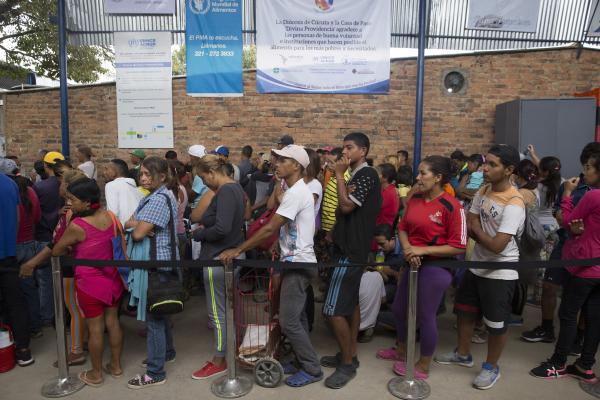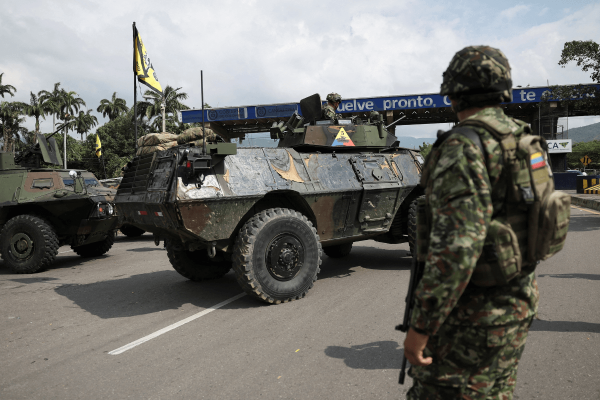CÚCUTA, COLOMBIA – It was 7 a.m. along the Colombia-Venezuela border and Daisy Godoy was planted in the same spot she was every morning: outside a soup kitchen with thousands of newly arrived Venezuelan migrants.
Her eight kids milled around her sporting blankets, pink Disney princess backpacks, and Crocs worn thin and covered in a veil of dirt.
Godoy and her family live in Venezuela — a country spiraling from hyperinflation, food and medicine shortages, and a new wave of political conflicts — and every morning the family wakes up at sunrise.
They hitchhike their way to the Colombian border where they cross and stand in a winding line outside Casa de Paso Divina Providencia, a migrant refuge and kitchen run by the Diocese of Cúcuta.
If they can’t find a ride, they walk hours instead. It’s hard, Godoy said, but they don’t have another choice. It’s the only reason they don’t starve.
“Right now we're going to return, and there [in Venezuela] we'll get nothing,” Godoy said as her 3-year-old laid his head on her shoulder.
“Sometimes we bring back a few Colombian pesos and that helps us a lot because you can't pay for anything with Venezuelan bolivars,” she said. “... You can't buy anything. Not a kilo of rice, not a carton of eggs.”
pic_3_1.jpg
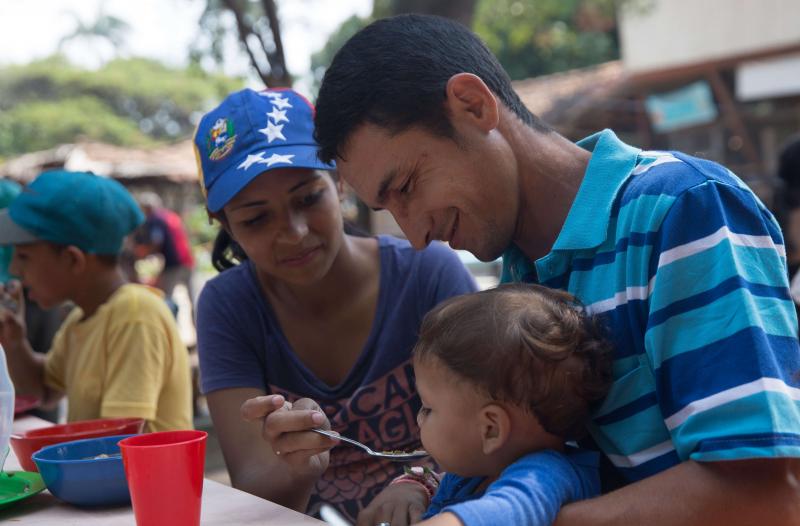
Around 42,000 Venezuelans cross Cúcuta’s border bridge every day, some fleeing with bags hoisted on their backs, and others like Godoy, simply trying to get food and medicine. The exodus has overwhelmed aid organizations like Red Cross and the United Nation’s refugee agency, whose facilities have been filled to the brim in places like the Cúcuta border.
More and more migrants flock to the city every day, especially now as political conflicts between Venezuelan President Nicolas Maduro and new opposition leader Juan Guaidó have reached a head.
And while the United States and international leaders have begun to send aid to the border to distribute in Venezuela, the churches fill a growing hole of need in cities like Cúcuta.
“If we didn't have these benefits, we would be in a very serious situation,” Godoy said. “It's just immense help.”
Scrambling to meet the need
The Diocese of Cúcuta alone serves 10,000 meals a day across the city, according to Cúcuta Bishop Victor Manuel Ochoa Cadavid.
The migrant shelter started from a small, almost involuntary move by Ochoa and other Cúcuta leaders in 2015, when the Maduro administration began deporting thousands of Colombians from Venezuela.
They took soup out to the streets to a couple hundred people, also helping the newly deported Colombians with housing.
“Never did we think it would grow this much,” Ochoa said. “We only thought about giving some soup. We wanted to give some soup and, with it, a little bit of care.”
In 2016, the trickle of those leaving Venezuela grew; the immigration crisis began, and church leaders started feeding the rising flow of migrants that arrived outside their doors.
In 2017, the shelter began serving 5,000 meals a day and, overwhelmed, bought a bigger space to serve the capacity of men, women, and children seeking aid every day.
In 2019, they reached 10,000 meals a day across the city, also providing people with medical and sanitary services. Today, Venezuelans, often comprising children and pregnant mothers, wind in lines around the shelter. Some accept plates and pieces of bread while others wait to speak to lawyers and medical staff.
pic_27.jpg
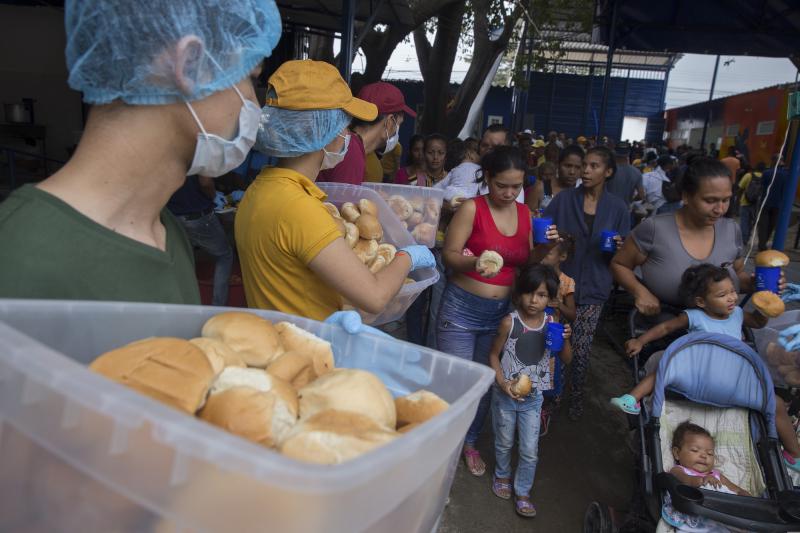
Jenderver Joel Castro Cordova was among them on Feb. 8. She sat with her two children, dipping her piece of bread into a cup of coffee handed to her minutes before by a volunteer. The two months since she’d fled from Venezuela has been rough on her, she said.
She came here to try and find work and support her family, but the crisis hit her hard.
“We came here for these two girls because there [in Venezuela] it's very grave,” she said. “Ultimately, we felt there would be change here, that we'd be able to find something to support them, but not yet. Though, here you can get a plate of food. There, no. There, if you eat in the morning, you don't eat in the afternoon.”
Colombia has absorbed the brunt of the exodus from Venezuela. The country’s government at the end of last year estimated that there were 1.3 million Venezuelans living in Colombia and many more passing through to other countries. But that number is likely vastly higher due to irregular migration patterns and lack of access to proper documentation.
Casa de Paso struggled to keep pace with the emerging crisis, and in October, another migrant shelter, Amigos de Prójimo, run by Christian missionaries from the U.S., opened with the goal of taking some of the weight off of the other shelters.
This time, though, the goal was to address a new wave of families and young children passing through to other cities and countries by foot.
“Talking to Venezuelans, the majority of them told us that the number one need is food,” Martin said. “These are the walkers. Number one is food; number two would be shoes.”
They positioned the shelter on the main road, 3 kilometers from the border where people with suitcases and backpacks often begin their journey.
At first, it was 300 people a day coming to the shelter, but with the controversial re-election of Maduro and the subsequent outbreak in protests, they saw a upshot at the beginning of this year.
Now, Martin said, they serve between 900 and 1,000 people a day, though they’ve felt at-capacity for months.
“There's bigger groups, families coming across,” Martin said. “Mothers, fathers, children. We've got groups of up to 24 people all traveling together. Before, it was just one person coming out to look for work. Now we're seeing everybody coming.”
And leaders say they only anticipate the situation worsening.
Maintaining hope
Tension has gripped Cúcuta in recent weeks as the border city has inadvertently become ground zero for political conflict brought forth by the rise of Venezuela’s new opposition leader, Juan Guaidó.
The politician worked with U.S. and international leaders to launch a flow of aid intended to cross into Venezuela and be distributed by the opposition. The first of the food and medicine from the U.S. arrived in Cúcuta in early February and was met with a military blockade by Maduro, who called the move a U.S. “strategy to overthrow the legitimate government.”
Thus far, Maduro has rejected foreign aid, refusing to recognize that there is a humanitarian crisis in Venezuela.
The churches serve a unique role as opposition aid rolls up to the border, staying stringently neutral in order to not politicize their work.
“This has no connection to politics,” said Cúcuta-based pastor Richard Hroph. “It is completely disconnected from what is happening. The aid comes from our desire to help others. When a need becomes obvious, the church can step up to the plate and do something about it.”
Though it’s not an easy thing to do.
The current and future waves of migration are contingent upon Venezuela’s political tumults. Migrants flooding their facilities and sleeping on the streets near the shelters hold onto the arrival of foreign aid and the new leader as a potential light at the end of the tunnel.
It was something Mary Mendoza clung onto as she walked into the Amigos de Prójimo shelter carrying plate of lentils and rice in one hand and a thermos of coffee she served on the street tucked into the crook of her elbow.
pic_12_1.jpg
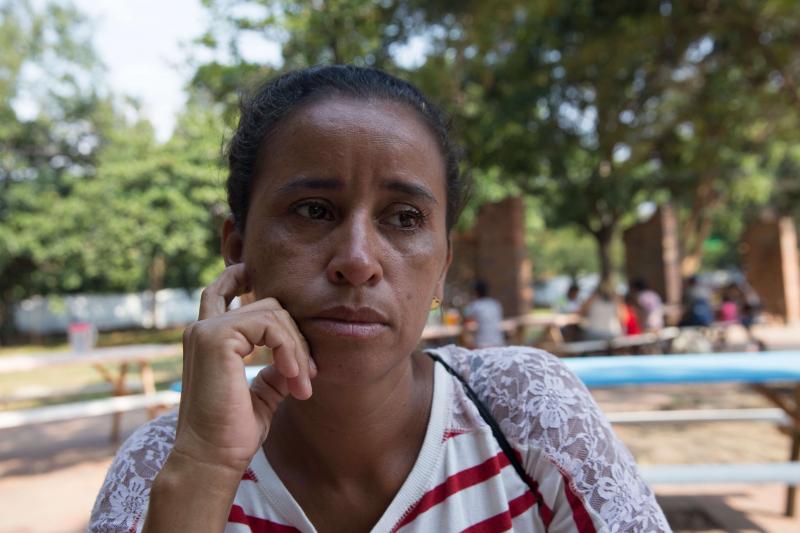
Mendoza had arrived six days before, hoping, like many, to find work in Cúcuta and send money back to her husband, mother, and four children. She walked the street and went door-to-door asking for work. Three days in and still fruitless, she began selling cups of instant coffee with throngs of other Venezuelans near the border crossing.
“When I feel alone, I think ‘Sir with all the power, help me to keep going, keep going for my children,’” she said. “It's really hard, truthfully. I don't know what will happen to me.”
She began leaning on the shelters so she could use the small change she made to buy soap to wash her clothes with. In Venezuela, she said, her daughter and mother wore dirty clothes every day because they didn’t have anything to wash them.
Over the years of political instability, Mendoza has grown hardened and skeptical about politicians stepping up to bat.
But it was that inherent hope she clung to. She had to.
“I hope that one day all of this ends and I can return,” Mendoza said. “This is my dream, my dream is that one day we can get up. Because, in truth, there are many children in the streets, hungry and thirsty, kids in the streets begging for someone to help them.”
Got something to say about what you're reading? We value your feedback!
